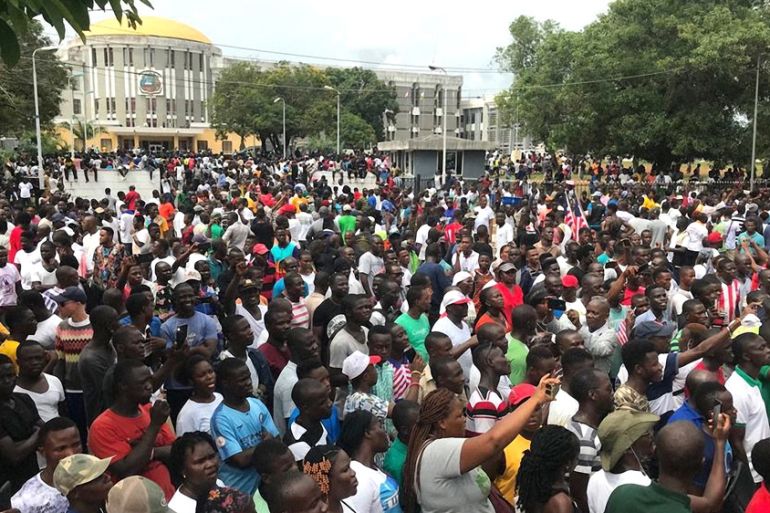Liberia: Thousands protest price hikes and corruption
Thousands of people take to the streets of the capital Monrovia to protest against rising cost of living in the country.

Thousands of demonstrators descended on Liberia’s capital, Monrovia on Friday to protest against rising prices and corruption, posing a key political test for President George Weah.
Weah is being challenged over the same issues on which he campaigned in his rise to the presidency of the West African state 18 months ago.
Keep reading
list of 4 itemsVietnam tycoon Truong My Lan sentenced to death in $12.5bn fraud case
Mexico cuts ties with Ecuador after police raid embassy
What’s behind the latest US sanctions on Zimbabwe President Mnangagwa?
“George Weah has to listen to the cry of his people,” said Joseph Moore, 65, as he sang songs of inspiration to the protesters.
About 10,000 people took part in the demonstration, according to the AFP news agency, while a police official put the turnout at around 4,000.
Some held aloft placards reading: “We are tired of suffering” and “We want better living conditions.”
Al Jazeera’s Ahmed Idris reporting from Monrovia said most roads leading to parliament where protesters planned to gather were block by security forces.
“Access to the grounds where the protest is taking place has been restricted by police. There are roadblocks on all roads leading to parliament. There is a lot of anger,” Idris said.
“Protester feel let down by the government and George Weah. This is by far the biggest challenge the president has faced since he came to office.” Idris added.
The global NetBlocks monitor said Twitter, Facebook, Instagram, Snapchat and WhatsApp were not working for Orange Liberia subscribers. The group tracks how governments interfere with internet access during politically sensitive periods.
On Thursday, Weah issued a statement defending his record, blaming past governments for the country’s entrenched problems and sternly warning the protest organisers.
“You can say whatever you want to, but be warned that cusses, insults and incitement of violence will never again be permitted under my administration,” he said.
Weah, a former FIFA player of the year, is revered in Liberia and beyond for blazing a trail for African footballers in Europe.
But he is struggling to revive a country that is one of the poorest in the world and still traumatised by back-to-back civil wars between 1989 and 2003 that claimed a quarter of a million lives.
Rising prices are a major source of discontent.
“Before, 500 LD (Liberian dollars; $2.50) was enough to adequately feed my family each day,” Angeline Flomo, a 35-year-old housewife and mother-of-four, said.
“Now, 1,000 LD can’t feed us. This is how bad things have become. A bag of 25 kilos of rice used to sell for 1,500 LD, now it is 2,800 to 3,000 LD. We are finding it difficult to make ends meet.”
Fingers are being pointed at past and present managers of the Central Bank of Liberia (CBL).
Last October, rumours swirled that newly printed Liberian dollars worth $102m, intended for the CBL’s reserves, had disappeared shortly after arrival from abroad.
Charles Sirleaf, the son of former president and Nobel laureate Ellen Johnson Sirleaf, was detained in March with two other CBL figures.
An independent probe found no money was missing, but flagged “concerns regarding the overall accuracy and completeness of the CBL’s internal records.”
More irregularities came to light related to a cash injection of $25m that Weah ordered in July 2018 to mop up excess Liberian dollars and bring inflation under control.
Weah, 52, says he is aware of the burden of ordinary people, and improvement to health, education and roads remain his priorities.
“We have done much over the short time to [address] bad conditions, which, of course, are not our making,” he said on Thursday.
“We met the hardship and inherited all the bad conditions and without making excuses, we are solving them.”
The protesters are also demanding the establishment of a war crimes court to prosecute people who bear the greatest responsibility for atrocities during Liberia’s civil wars.
Former President Charles Taylor was convicted of war crimes at the Special Court for Sierra Leone though the charges were related to atrocities in neighbouring Sierra Leone.